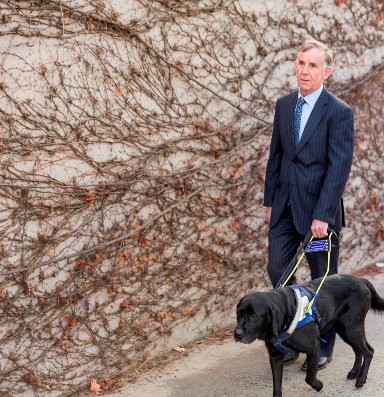Imagine your life without vision. How would you know who you are talking to when they haven’t introduced themselves, what banknote you have just pulled out of your wallet or whether you might have enjoyed watching the latest trending television series? Then there is getting around.
As a blind person, I have been turned away from restaurants and even airlines. Why? Because I have a seeing eye dog.
But, the worst situations by far are the ones that make me feel like a second class citizen. I have been refused access to taxis many times, sometimes aggressively. This rejection is demeaning and stressful particularly if it makes me late for work or leaves me stranded in bad weather or on the streets at night.
And this doesn’t just happen to me. Vision Australia research has found that one in two handlers feel discriminated against while out with a seeing eye dog and more than half have been refused access to a public space.
For the 900 Australians with such dogs these statistics highlight the disappointing reality that they are regularly prevented from going about their business.
This discrimination is particularly galling as laws protecting access rights for handlers and their seeing eye dogs have been around for half a century.
Stopping this discrimination and educating all Australians about the need to welcome our “six-legged partnerships” into workplaces, shops and on all forms of transport must remain a priority for government, businesses and the community.
Why? The statistics speak for themselves. Unemployment among Australians who are blind or have low vision is 58 per cent; and around one-third of this community suffer depression, a rate that is more than seven times higher than the general community. The reasons are manifold and complex, but freedom of movement and removing the barriers to social isolation are essential for this community to have access to life, for life.
I have had an assistance dog for 30 years since losing my sight at the age of 28. I have had four dogs that have given me enhanced independence and remarkable companionship. My dogs have travelled far and wide with me, to places like Belguim, the USA, and New Zealand. One of my dogs, Sam, was the first seeing eye dog to get his blind handler (me) to the top of the Acropolis on Tasmania’s Cradle Mountain trek. Seeing eye dogs are highly trained and cleaner than most shoes that enter buildings and taxis without question. My current seeing eye dog, Kane, even has a staff photo and the job title of ‘mobility officer’ at my office at Deakin University.
Since State Governments legislated to protect the rights of people with seeing eye dogs in the 1960s, several governments have extended these protections to puppies in training.
However, there is not enough consistency in access laws across the states. They could and should go further to introduce consistency and adopt the practice of enforcing penalties for offenders. In Queensland, dogs have rights at all stages of their life. Penalties of up to $11,000 apply to individuals and $55,000 to businesses when these rights are violated. In an ideal world these penalties are not used but they act as a strong deterrent for people who breach the law. However, in Victoria there is no system of penalties and volunteers working with puppies are not explicitly mentioned in the legislation.
Nationally, the Commonwealth Disability Discrimination Act 1992 also protects people with disability who are paired with an assistance animal. However, it has no real enforcement mechanism and while a person can pursue a complaint, it is a lengthy process and may be concluded without any result.
Laws alone do not stop discrimination. People do. Whether it’s a business owner or their employees, or a person in the community they all need to make seeing eye dogs welcome.
A seeing eye dog in training. One day, this dog will go on to support its handler navigate their community safely and with confidence.
Kane is not an ordinary dog. He is an extraordinary dog. Thanks to our “six-legged” partnership, I live a full and rewarding life. My right to this life is the same as yours. And, this is why our rights are protected by law.
I implore all Australians to back dogs that have paws with purpose. Today, on International Guide Dog Day, I ask you to show your support for handlers like me and dogs like Kane.
Please tweet a photo of you or your business with a dog bowl and your message of support to @visionaustralia #seeingeyedogsaustralia #pawswithpurpose #IGDD
Dr Kevin Murfitt holds a Doctor of Philosophy and is a lecturer in disability and inclusion at Deakin University.
Kevin is past chair and current director of the Vision Australia Board and coordinates the Willing and Able Mentoring Program. Kevin was Vice President of the Royal Victorian Institute for the Blind and received a 2002 HREOC Human Rights Award for contributing to the Disability Discrimination Act (1992) Accessible Public Transport Standards.











